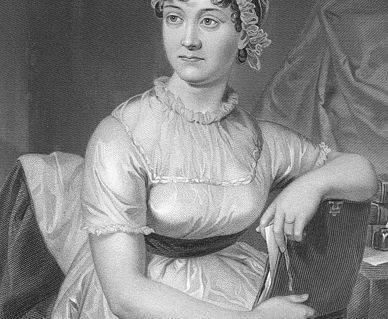Pride With Prejudice

Jane Austen (16 December 1775 to 18 July 1817)
“Her acute sense of character, her bland irony, her exquisite powers of organisation and presentation, turned the uneventful lives of well-fed people in quiet corners into enchanting novels.”* She may have belonged, as Edward Said claimed, ‘to a slave-owning society,’ but Jane Austen was a great writer – one of the very greatest – of small things, and the interior of the provincial English mind. She wasn’t so fussed about ‘themes.’ She wrote about girls looking for a man to marry, which was of prime importance then; today, 200 years after her premature demise, this antique quest (or dilemma) is simply the backdrop for her sophisticated, tasteful, ironic, perfectly-poised prose. And she was shrewdly ‘on to’ her characters – Miss Austen might have been prim and proper, but in no way was she ‘soft.’
In a rather sweeping statement, H. L. Mencken said: “women succeed in the novel – and…they will succeed even more strikingly as they gradually throw off the inhibitions that have hitherto cobwebbed their minds – simply because they are better fitted for this realistic representation than men – because they see the facts of life more sharply, and are less distracted by moony dreams.”** And while it is true that Austen endures because she is disinterested in style and prefers to present her story without adornment, her limpid writing is full of psychological layers, that give a much richer payoff than, say, the romantic flourishes of her impressive contemporary, Walter Scott.
Her great works are: Emma (1815), Mansfield Park (1814), Northanger Abbey (1818), Persuasion (1818), and Pride and Prejudice (1813). Of these, and although perhaps Mansfield Park is the best, the one that continues to fully blossom, over and over again, is Pride and Prejudice. There Miss Austen displays a talent for the funny, the brilliant and grotesque as accomplished as anything in Dickens (think of Elizabeth Bennet, Darcy, Mr Collins (who never reads novels), Lady de Bourgh, Miss Bingley, and even silly old Da, Mr Bennet). Elizabeth is a superb heroine – clever, witty, and knowing, but apt to jump to conclusions (the book was initially incarnated as “First Impressions.”). Darcy is Benedick to her Beatrice, but the book centres on her, the far more interesting of the pair.
This book, more than any of her others, was re-worked extensively and at great length. The author said that she “lop’t and crop’t’ it, and whilst re-writing is the key to successful writing, the miracle of Pride and Prejudice is how silken it is, how its narrative drive manages to be so irresistible, without any of the artifice painfully apparent in modern novels. (Austen would have made a great editor as well.)
Some illustrative extracts are below:
“Lady Catherine, Sir William, and Mr. and Mrs. Collins sat down to quadrille, and as Miss de Bourgh chose to play at cassino, the two girls had the honour of assisting Mrs. Jenkinson to make up her party. Their table was superlatively stupid.”
“We all love to instruct, though we can teach only what is not worth knowing.”
“…every day confirms my belief of the inconsistency of all human characters, and of the little dependence that can be placed on the appearance of merit or sense.”
“For what do we live, but to make sport for our neighbors, and laugh at them in our turn?”
“Happy for all her maternal feelings was the day on which Mrs. Bennet got rid of her two most deserving daughters.”
“I must learn to be content with being happier than I deserve.”
“We all know him to be a proud, unpleasant sort of man; but this would be nothing if you really liked him.”
“It is a truth universally acknowledged that a single man in possession of a good fortune must be in want of a wife.”
As ever with Austen, a clean and happy ending beckons. Darcy overcomes his pride, and Elizabeth her prejudice.
[*J.B. Priestley, Literature and Western Man (1960), p. 154.] [**”Women as Novelists” from Selected Prejudices (1927), p. 92.]Leave a comment...
While your email address is required to post a comment, it will NOT be published.



1 Comment